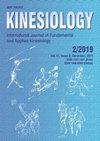Precise verbal feedback may expedite the attainment of standing long jump accuracy in women
IF 0.9
4区 医学
Q4 REHABILITATION
引用次数: 0
Abstract
The purpose of this study was to determine whether the precision of verbal feedback affected the accuracy of a standing long jump performance. Sixty-eight female participants (M age=21.44±1.01) were randomly assigned to two experimental groups. In total, each subject performed nine jumps at three distances, i.e. 50 cm (3 trials), 75 cm (3 trials) and 100 cm (3 trials). Group 2 performed jumps in a reverse order. During the task execution, the study participants received verbal feedback at different levels of precision (no feedback; information that the jump was either: too far, close, or correct; information about the distance in centimetres). The results of statistical analysis indicated that the speed of changes in jump accuracy depended on the precision of verbal feedback. The difference between an actual jump result and a target result increased proportionally with jump length. With a large number of trials, verbal feedback accuracy does not affect significantly the precision of women’s long jump performance. However, when the high accuracy of task performance needs to be obtained quickly, feedback ought to define the exact difference between the target and the actual jump results. The current findings also indicate that providing no feedback does not contribute to improving motor task performance accuracy.准确的口头反馈可以加快女子立定跳远的准确性
本研究的目的是确定言语反馈的准确性是否影响立定跳远表演的准确性。68名女性受试者(M年龄=21.44±1.01)随机分为两个实验组。每位受试者共进行了9次跳跃,跳跃距离为50厘米(3次)、75厘米(3次)和100厘米(3次)。第二组以相反的顺序跳跃。在任务执行过程中,研究参与者收到了不同精确度的口头反馈(没有反馈;跳得太远、太近或正确的信息;以厘米为单位的距离信息。统计分析结果表明,跳跃精度的变化速度与言语反馈的精度有关。实际跳跃结果和目标结果之间的差异随着跳跃长度成比例地增加。通过大量的实验,口头反馈的准确性对女子跳远成绩的准确性没有显著的影响。然而,当需要快速获得任务性能的高精度时,反馈应该定义目标与实际跳转结果之间的确切差异。目前的研究结果还表明,不提供反馈并不有助于提高运动任务表现的准确性。
本文章由计算机程序翻译,如有差异,请以英文原文为准。
求助全文
约1分钟内获得全文
求助全文
来源期刊

Kinesiology
REHABILITATION-SPORT SCIENCES
CiteScore
1.90
自引率
8.30%
发文量
16
审稿时长
>12 weeks
期刊介绍:
Kinesiology – International Journal of Fundamental and Applied Kinesiology (print ISSN 1331- 1441, online ISSN 1848-638X) publishes twice a year scientific papers and other written material from kinesiology (a scientific discipline which investigates art and science of human movement; in the meaning and scope close to the idiom “sport sciences”) and other adjacent human sciences focused on sport and exercise, primarily from anthropology (biological and cultural alike), medicine, sociology, psychology, natural sciences and mathematics applied to sport in its broadest sense, history, and others. Contributions of high scientific interest, including also results of theoretical analyses and their practical application in physical education, sport, physical recreation and kinesitherapy, are accepted for publication. The following sections define the scope of the journal: Sport and sports activities, Physical education, Recreation/leisure, Kinesiological anthropology, Training methods, Biology of sport and exercise, Sports medicine and physiology of sport, Biomechanics, History of sport and Book reviews with news.
 求助内容:
求助内容: 应助结果提醒方式:
应助结果提醒方式:


